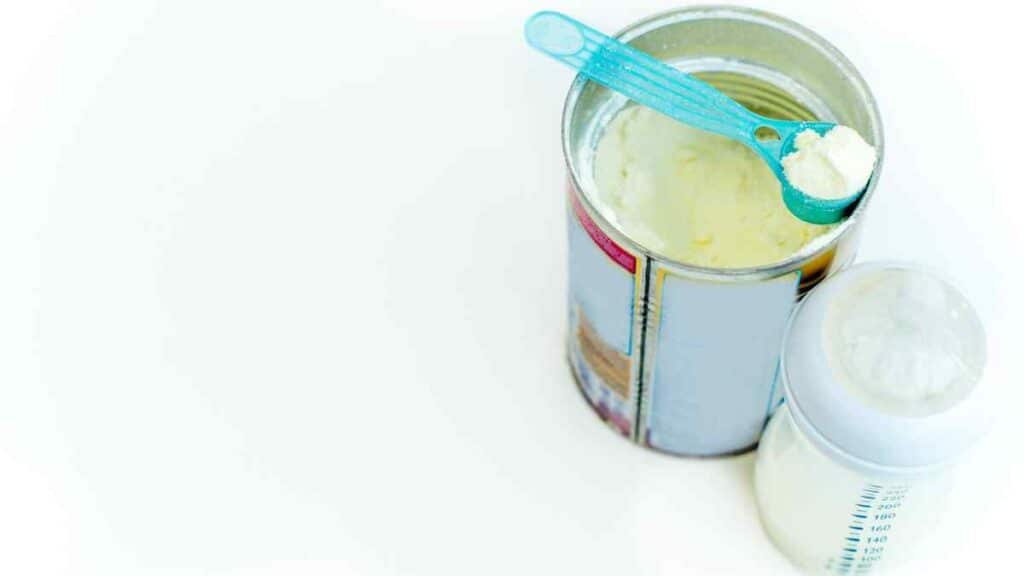Changing your baby’s formula can be a big decision, but it doesn’t have to be difficult. Whether you’re switching to a more natural formula or making the switch because your baby is intolerant of a certain ingredient, there are ways to make the transition as smooth as possible.
In this blog post, we’ll explore everything you need to know about changing your baby’s formula, including what signs indicate it may be time for a change and tips for making the switch successfully.

Why Changing Formula May Be Necessary
Switching baby formulas may be necessary for various reasons, including digestive issues caused by an intolerance or allergy to certain ingredients in the current formula. For example, some babies may experience constipation, diarrhea, or upset stomach due to a milk or food allergy. In such cases, switching to a hypoallergenic formula recommended by the baby’s pediatrician can provide relief.
As babies grow and develop, their nutritional needs also change, and formula companies offer different products to meet these evolving needs, such as transitioning from a newborn to a toddler formula. Changes in the feeding schedule or amount consumed can also warrant a switch in formulas.
When you switch baby formula, do it gradually with the baby’s doctor’s guidance. This helps avoid upsetting the baby’s immature digestive system, which can cause stomach cramps or excessive crying. It’s best to slowly transition from the current formula to a new one, whether it’s powdered, soy, or hypoallergenic, to ensure good results. You may also need to adjust homemade formula or bottle feeding sometimes. Your baby’s doctor can provide specific recommendations based on the baby’s bowel habits, food allergies, and overall health.
Understanding the Different Types of Infant Formula
With so many options on the market, it’s important to understand the different types of formula available so you can provide your child with the proper nutrition. The three main types of infant formula are cow’s milk-based, soy-based, and special-purpose formulas.
Cow’s milk-based formula: Cow’s milk-based formula is the most common type and provides a balanced source of infant nutrition. It may be modified to be easier to digest for infants sensitive to lactose or protein.
Soy-based formula: Soy-based formula, also known as Soy formula, is a popular alternative for infants who cannot tolerate cow’s milk or have a family history of cow’s milk protein allergy. This formula provides a source of nutrition for young babies without using cow’s milk.
Hydrolyzed protein formula: Pediatricians recommend Hydrolyzed Protein Formula to most babies with protein sensitivities. The proteins in this formula have been broken down into smaller pieces, making them easier to digest. It’s available in both partially hydrolyzed formulas and extensively hydrolyzed formulas.
Special purpose formulas: Special purpose formulas are intended for infants with specific health conditions or nutritional needs, such as lactose intolerance, severe allergies, or certain metabolic disorders.
Tips for Choosing the Right Formula for Your Baby
Choosing the right formula for your baby can be daunting, but it’s crucial to ensure they get the proper nutrients they need for optimal growth and development. To help make the process easier, here are some tips to consider when selecting a formula for your baby:
Consult a pediatrician: Your doctor is the best resource for determining which formula is appropriate for your baby based on their specific health needs and dietary restrictions.
Consider your baby’s age: Different formulas are formulated for different age groups and provide additional nutrients for infants at various stages of development.
Choose based on your baby’s dietary needs: Some babies have special dietary needs, such as lactose intolerance or a cow’s milk protein allergy. There are formulas available that cater to these needs.

Read the label: Look for a formula that provides essential vitamins, minerals, and nutrients, such as iron, calcium, and vitamin D.
Check for any artificial additives: Some formulas contain artificial ingredients, such as high fructose corn syrup or added sugars, which may not be ideal for your baby.
Consider cost and availability: Formula can be expensive, so choosing a formula that fits your budget and is readily available in your area is essential.
Consider your baby’s reaction: Finally, observe how your baby reacts to the formula, as some babies may have digestive issues with specific brands or types of formula.
How to Introduce the New Formula to Your Baby
So you’ve decided to switch up your baby’s formula. That’s great! You’re doing your best to provide the best nutrition for them, and we’re here to help.
Here are some tips on how to make the transition as smooth as possible:
- Start by mixing a few tablespoons of the new formula with an equal amount of their old formula. This will help them get used to the new flavor.
- Gradually increase the amount of the new formula until you’re using only the new kind. You can also add water or milk if it seems too thick for your baby’s liking.
- Get ready by ensuring that all supplies are stocked in case of any difficulties during this process (such as gas pains).
Common Concerns and Side Effects of Formula Change
There are a lot of things that parents worry about when they’re considering changing formula. One of the most common concerns is whether or not the change will make their baby sick, but many other possible side effects can occur. The most common side effects include:
Digestive Issues: A change in formula can sometimes cause digestive issues, such as constipation, diarrhea, or upset stomach, due to a different composition of ingredients.
Allergic Reactions: Some babies may be allergic to certain formula ingredients, such as cows’ milk protein or soy. Symptoms can include rash, hives, or vomiting.
Gas and Bloating: A change in formula can also cause increased gas and bloating in some babies.
Decreased Appetite: In some cases, a change in formula can result in a reduced appetite for some babies, leading to weight loss or growth issues.
Sleep Disturbances: Some babies may experience sleep disturbances, such as increased fussiness or trouble sleeping, after a change in formula.
Change in Stool Consistency: A change in formula can sometimes lead to a change in the consistency of your baby’s stool, including increased frequency or changes in texture.
If you have concerns about a change in formula, it is best to consult a pediatrician. Additionally, if your baby experiences any adverse reactions, it is essential to discontinue the formula and seek medical attention.
How Long Does It Take for a Baby to Adapt to a New Formula
If you’re switching your baby to a new formula, you must be patient and watch for adverse reactions. It may take a few days to a week for them to adjust fully. You should consult your family physician or child’s pediatrician if you notice any concerning symptoms such as painful stomach cramps, excessive crying, or too much air when they pass stool. They may recommend an immediate switch to a different formula, such as a hypoallergenic or soy-based formula if they suspect a milk allergy or other medical condition. If you have concerns about switching baby formulas, be sure to consult with your child’s doctor.

Supporting Your Baby During the Transition
As your baby grows, you may wonder how best to support her through her transition from newborn to toddler. Here are some tips:
1. Help them develop their sense of self-control. This will make the transition easier for both of you. Encourage them to try new things and set limits when necessary. Tell them they can always come to you if they want help or guidance with something they’re struggling with.
2. Make sure they have plenty of opportunities to practice their motor skills as they grow older. This will help them become more confident in their ability to do things on their while also helping them develop stronger muscles and bones that will support them as they grow older and move around throughout the day.
3. Give them plenty of opportunities for social interaction with other children so they can practice interacting without feeling overwhelmed!
Frequently Asked Questions about Changing Formula
Here are some common questions and answers about changing formula:
1. When should I start changing my baby’s formula?
Answer: It’s best to talk to your pediatrician about when to switch your baby’s formula. Babies can generally transition from breast milk or formula to solid foods at around six months, but this can vary for each baby. Your pediatrician can give you specific guidance based on your baby’s individual needs and development.
2. What should I look for in a new formula?
Answer: Consider your baby’s needs, allergies, or sensitivities when choosing a new formula. Consider the type of protein in the formula (such as cow’s milk, soy, or hydrolyzed protein) and the iron content. It’s important to talk to your pediatrician before making any changes to your baby’s formula.
Question:
3. How do I know if my baby is ready for a new formula?
Answer: Some signs that your baby may be ready for a new formula include a decrease in weight gain, increased fussiness or gas, or changes in bowel movements. However, it’s always best to talk to your pediatrician to determine if it’s time to switch formulas.
Question:
4. Can switching formulas cause digestive problems?
Answer: Switching formulas can sometimes cause digestive problems, such as gas, bloating, and diarrhea.
5. Can switching formulas cause an allergic reaction?
Answer: Yes, switching formulas can sometimes cause an allergic reaction, especially if your baby has a history of allergies. If you notice any signs of an allergic reaction, such as hives, vomiting, or difficulty breathing, it’s important to seek medical attention immediately.
Remember, every baby is different, and the best formula for your baby will depend on their needs and development.

Final Thoughts
When it comes to a baby’s health and well-being, there are many factors to consider and decisions to be made. It is important to gather information from trusted sources, consult with healthcare professionals, and ultimately trust your instincts as a parent.
Your baby’s health and happiness are your top priority, and the right choice will depend on your circumstances and beliefs. Remember to prioritize self-care, as taking care of yourself can positively impact your baby’s health and development.
We’re glad to hear that this article helped you!
We’re glad to hear that this article helped you! If you have any questions, please leave them in the comments below.



